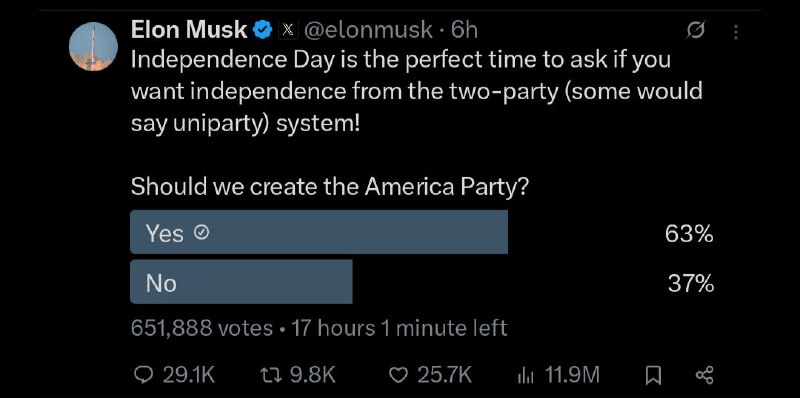Elon Musk’s bold push to create the “America Party” is gaining traction on X, with a poll launched on Independence Day, July 4, 2025, showing 63% approval from over 651,888 voters. The Tesla mogul’s initiative, aimed at breaking free from the two-party system, follows his rift with President Trump over the “One Big Beautiful Bill.” With a strategic plan to target key congressional seats, is this a game-changer or a billionaire’s gamble? Let’s break it down.

Poll Soars to 63% Yes on X
Musk’s X post on July 4 asked, “Should we create the America Party?” and ignited a firestorm, with 63% voting “Yes” and 37% “No” as of early Saturday. The poll, linked at https://x.com/elonmusk/status/1941119099532378580, has drawn over 186,000 participants, reflecting strong support. Posts found on X cheer this as a “rebellion against the uniparty,” though the self-selected sample raises questions about its broader appeal.
Strategic Play for Congressional Power
In a follow-up post, Musk outlined a plan to “laser-focus” on 2-3 Senate seats and 8-10 House districts, leveraging razor-thin legislative margins to act as a deciding vote. This strategy, detailed at https://x.com/elonmusk/status/1941125459628179641, aims to shape contentious laws and reflect “the true will of the people.” Analysts note this could disrupt the 2026 midterms, but logistical hurdles like ballot access loom large.
Roots in Trump Bill Fallout
The vote stems from Musk’s exit from Trump’s Department of Government Efficiency (DOGE) and his opposition to the $5 trillion “Big Beautiful Bill,” passed July 3. Musk calls it “insane spending,” fueling his break with Trump. Posts found on X suggest personal vendetta, with one user quipping, “Elon’s mad he lost his DOGE bone,” hinting at mixed motives behind this crypto market surge 2025.
Public Split: Enthusiasm vs. Doubt
Sentiment on X is polarized. Supporters, citing a Quantus Insights poll where 40% back the idea, see it as a fresh start for the “80% in the middle.” Critics warn of a vote split favoring Democrats, echoing Ross Perot’s 1992 impact. Musk’s 220 million X followers amplify the reach, but experts question if this translates to real votes.

Establishment Braces for Impact
The Trump camp and GOP leaders dismiss this as a “vanity project,” arguing Musk lacks a cohesive platform. Political analysts highlight structural barriers—funding, legal challenges, and voter inertia—that have sunk third parties before. Yet, Musk’s wealth and influence challenge the establishment’s claim that this will fizzle, keeping the debate alive.
What Lies Ahead for the America Party?
As the poll closes Saturday morning, Musk’s next move is unclear. His strategy hinges on congressional influence, but success depends on overcoming electoral hurdles. Is this a serious political shift or a high-profile distraction? With eyes on 2026, the outcome could reshape U.S. politics—or fade into obscurity.







































